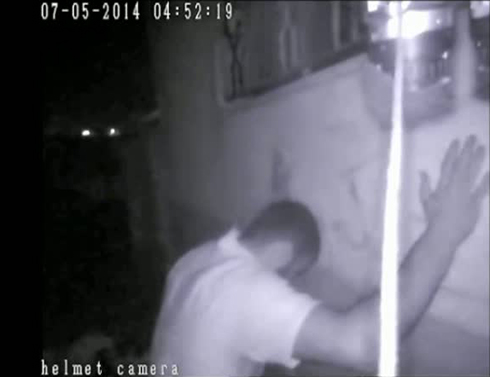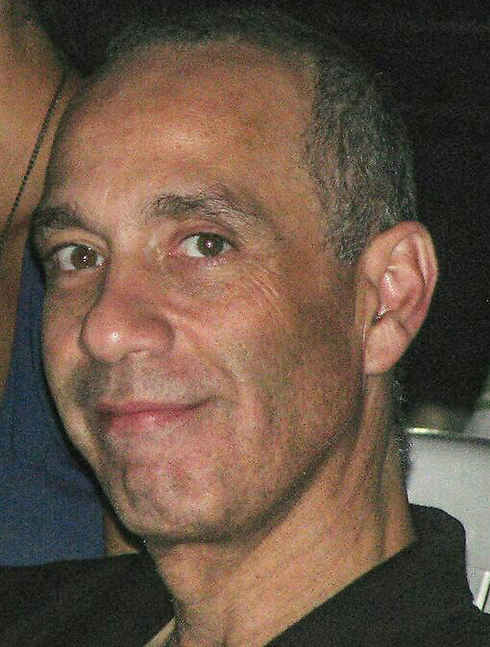Cleared for publication: Police Chief Superintendent Baruch Mizrahi was killed by Ziad Awad, who confided to his son that the reason for the attack was religious, saying “according to the Islam, whoever kills a Jew goes to heaven.”
By Yoav Zitun
The killer of Baruch Mizrahi, the senior Israeli police officer killed in a Passover eve terror attack near Hebron, was a Palestinian released in the prisoner exchange deal which saw Gilad Shalit freed in 2011 in return for 1,027 Palestinian prisoners, it was cleared for publication Monday.

Awad’s arrest last month – IDF Helmet Camera Photo: IDF Spokesperson’s Unit
An indictment was filed Monday against Ziad Awad, a resident of the village of Idna near Hebron, for murder and attempted murder.
Awad was freed in the first tranche of the Shalit prisoner exchange deal, after he was sentenced to life in prison for murdering Palestinians who had collaborated with Israel.
Chief Superintendent Mizrahi, a senior officer in the Israel Police, was killed when a gunman armed with what is believed to have been a Kalashnikov opened fire on Israeli cars near Hebron as they travelled to a Passover Seder in the Kiryat Arba settlement. His wife and nine-year-old son were wounded in the attack. Mizrahi left behind five children.
Murderer confided in his son that the reason for the attack was religious, saying “according to the Islam, whoever kills a Jew goes to heaven.”
Awad, 42, was arrested last month by the Shin Bet and the police in a special operation together with the IDF. He was arrested together with his son Izz a-Din, 18, who helped him plan the attack as well as flee the murder scene and hide. Both father and son are members of Hamas.
During their interrogation, it was discovered the father rode a motorcycle to the scene of the attack, having obtained the Kalashnikov rifle beforehand. According to the Shin Bet, he arrived at the place a week and a half before Passover eve to better plan his attack.
Before launching the attack, he confided in his son that the reason for the attack was religious, saying “according to the Islam, whoever kills a Jew goes to heaven.”
According to a senior IDF source, “the murder was conducted in professional manner and (Awad) then fled the scene on a motorcycle, returning to his home in the village.
Freed before completing half of sentence
During the investigation into Mizrahi’s murder, security forces located the Kalashnikov rifle allegedly used by Awad.

Baruch Mizrahi ז”ל – Photo: Reproduction
In contraction to initial assessments, as the investigation progressed evidence indicated that the attack was perpetrated by a sole terrorist. The assumption was based on the large number of shells found at the scene. What led investigators to Awad was DNA evidence collected from the shell casings. The IDF and Shin Bet are still searching for additional people involved in the shooting.
Ultimately, physical evidence allowed investigators to create a profile for the murder, which helped them close in on Awad.
Awad was initially arrested in 1999 and began serving what was supposed to be a 27-year prison term for murdering Palestinian collaborators, but he was released in 2011 as part of the deal to free Shalit, who had been held captive in Gaza for five years.
A few days after his murder, Mizrahi’s wife, Hadas, recalled the incident: “We passed the Tarqumia checkpoint and a traffic circle, and then Baruch saw a terrorist. He told me, ‘they’re shooting, they’re shooting, they’re shooting. There’s a terrorist.’ Baruch put his foot down on the gas pedal.”
“I felt a pain in my back. I told the kids, ‘take off your seatbelts and lie down on the floor’. I took the steering wheel, shifted into low gear and used the handbrake to reduce the speed,” said Hadas.
“I used a rag to wipe up the blood; I saw that Baruch was dead. When the soldiers arrived, I told them to dress my wounds and put the children in a protected vehicle, so that they didn’t see their father lying dead,” she recalled.
Mizrahi was the head of the tech division of the Israel Police. He had served for 25 years in the IDF, holding senior posts in elite intelligence units. A police statement said that his contributions to Israel’s security had been “substantial”.
Large numbers of IDF troops have been deployed to the West Bank over the past 10 days, following the abduction of three Israeli teens in the Hebron area on June 12. Awad’s arrest is not connected to the search for the three boys, the IDF said.
View original Ynet publication at: http://www.ynetnews.com/articles/0,7340,L-4533556,00.html






 Israeli New Shekel Exchange Rate
Israeli New Shekel Exchange Rate